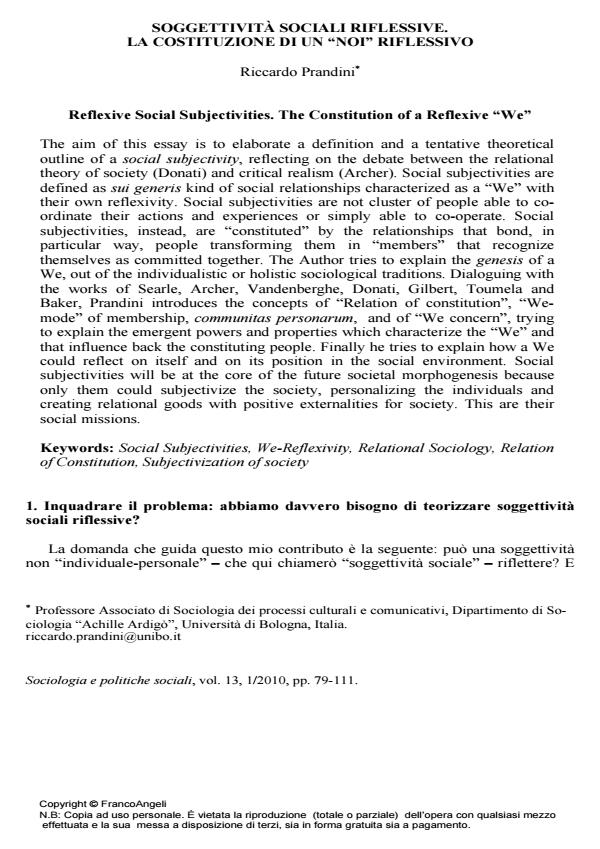Soggettività sociali riflessive. La costituzione di un "Noi" riflessivo
Titolo Rivista SOCIOLOGIA E POLITICHE SOCIALI
Autori/Curatori Riccardo Prandini
Anno di pubblicazione 2010 Fascicolo 2010/1
Lingua Italiano Numero pagine 33 P. 79-111 Dimensione file 543 KB
DOI 10.3280/SP2010-001005
Il DOI è il codice a barre della proprietà intellettuale: per saperne di più
clicca qui
Qui sotto puoi vedere in anteprima la prima pagina di questo articolo.
Se questo articolo ti interessa, lo puoi acquistare (e scaricare in formato pdf) seguendo le facili indicazioni per acquistare il download credit. Acquista Download Credits per scaricare questo Articolo in formato PDF

FrancoAngeli è membro della Publishers International Linking Association, Inc (PILA), associazione indipendente e non profit per facilitare (attraverso i servizi tecnologici implementati da CrossRef.org) l’accesso degli studiosi ai contenuti digitali nelle pubblicazioni professionali e scientifiche.
The aim of this essay is to elaborate a definition and a tentative theoretical outline of a social subjectivity, reflecting on the debate between the relational theory of society (Donati) and critical realism (Archer). Social subjectivities are defined as sui generis kind of social relationships characterized as a "We" with their own reflexivity. Social subjectivities are not cluster of people able to coordinate their actions and experiences or simply able to co-operate. Social subjectivities, instead, are "constituted" by the relationships that bond, in particular way, people transforming them in "members" that recognize themselves as committed together. The Author tries to explain the genesis of a We, out of the individualistic or holistic sociological traditions. Dialoguing with the works of Searle, Archer, Vandenberghe, Donati, Gilbert, Toumela and Baker, Prandini introduces the concepts of "Relation of constitution", "Wemode" of membership, communitas personarum, and of "We concern", trying to explain the emergent powers and properties which characterize the "We" and that influence back the constituting people. Finally he tries to explain how a We could reflect on itself and on its position in the social environment. Social subjectivities will be at the core of the future societal morphogenesis because only them could subjectivize the society, personalizing the individuals and creating relational goods with positive externalities for society. This are their social missions.
Parole chiave:Social Subjectivities, We-Reflexivity, Relational Sociology, Relation of Constitution, Subjectivization of society
- Welfare sharing: an emerging paradigm? An explorative study based on two cases Martina Visentin, in SOCIOLOGIA DEL LAVORO 152/2018 pp.139
DOI: 10.3280/SL2018-152008 - Le conseguenze del contratto: confini, ruoli e mandati organizzativi nell'erogazione di servizi pubblici. Il caso di "Punto d'Accordo" a Modena Eleonora Costantini, in STUDI ORGANIZZATIVI 1/2020 pp.118
DOI: 10.3280/SO2020-001005 - Partnership e sequenzializzazione dell'incertezza. Esempi di logiche generative Matteo Orlandini, in SOCIOLOGIA E POLITICHE SOCIALI 1/2015
DOI: 10.3280/SP2015-001004
Riccardo Prandini, Soggettività sociali riflessive. La costituzione di un "Noi" riflessivo in "SOCIOLOGIA E POLITICHE SOCIALI" 1/2010, pp 79-111, DOI: 10.3280/SP2010-001005